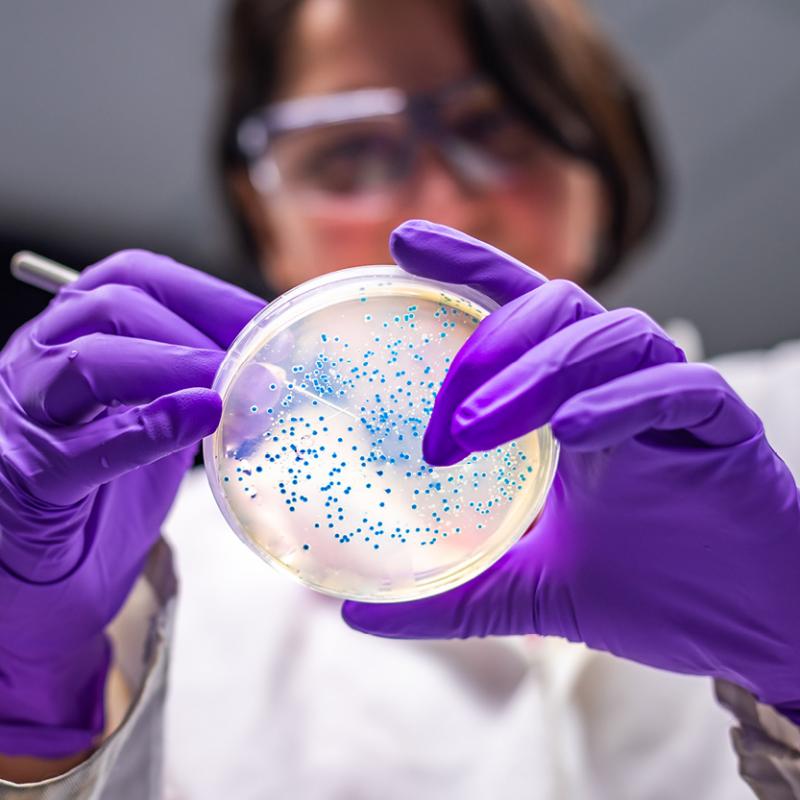
Protect human health and promote healthy environments
Environmental health addresses risk factors in our environments (such as smoke, air-, water- , and food-borne pollutants and toxins) and the threats they pose to certain populations and their health. Practitioners promote and protect human health and well-being by understanding and assessing the risks posed and working to mitigate the environmental hazards.
Perfect for students who want to
- Advance their career in applied environmental health
- Work in state or federal health agencies (e.g., EPA, FDA, CDC)
- Address threats to health posed by climate change
- Promote sustainability in food, energy and water systems
- Advocate for policies that reduce toxic exposures in air, water, soil and food
- Provide communities with healthier environments
Career Paths
- State Departments of Health
- Federal agency environmental officer
- Safety office in industry
- Medicine and public health
- Academia - environmental health research
- Environmental health consulting
Program Overview
The Master of Public Health program will prepare graduates to work in public health service as practitioners, researchers, administrators, and consultants. The mission of the MPH program with concentration in Environmental Health Sciences is to promote the development of professional practitioners and researchers in environmental health who understand the science, theory and practice of public and environmental health, and can apply this knowledge toward the detection, management, and prevention of environmental health problems.
Click here to view our GEOH programs flier.
See all Global, Environmental, and Occupational Health student resources.
used in consumer products in the
US, less than 1% have been
rigorously tested for human safety
(according to the EPA).
Graduates with an MPH in Environmental Health Sciences will be able to:
- Assess environmental and occupational hazards that pose a risk to human health and safety.
- Identify components of racism and environmental injustice that influence differential burdens of environmental exposures.
- Identify tools for exposure assessment to environmental hazards.
- Identify vulnerable populations and develop and apply risk management and risk communication approaches that address issues of environmental justice and equity.
- Apply concepts of physiological susceptibility and behavioral vulnerability to evaluate hazards.
- Critique and apply current environmental risk assessment methods.
- Integrate, synthesize, and apply environmental /occupational health theory to practice in the context of a research study.
- Critique federal and state regulatory programs, guidelines, and authorities that control environmental-occupational health issues.
The MPH in Environmental Health Sciences is 45 credits including an internship and capstone experience.
View all required courses for the MPH in Environmental Health Sciences in the UMD Graduate Catalog.
*In order to meet the academic standards of GEOH Students must achieve a grade of B- or higher in all required courses (ie: all MIEH and SPHL courses). Failure to meet this requirement will result in the need for a student to retake a course in which they earn a C+ or lower.
| Course Module | Course Name | Credits |
|---|---|---|
| Required School of Public Health courses | ||
| (14 Credits) | SPHL 601 Foundations of Public Health | 1 |
| EPIB 650 Biostatistics 1 | 3 | |
| EPIB 610 Foundations of Epidemiology | 3 | |
| SPHL 610 Program Planning and Evaluation | 5 | |
| SPHL 611 Public Health Ethics | 1 | |
| SPHL 620 Leadership in Public Health | 2 | |
| Cognate Area | ||
| (18 Credits) | MIEH 600 Foundations of Environmental Health | 3 |
| MIEH 720 Principles of Toxicology | 3 | |
| MIEH 740 Risk Assessment | 3 | |
| MIEH 770 Law and Policy in Environmental Health | 3 | |
| MIEH 771 Exposure Assessment | 3 | |
| MIEH 780 Environmental and Occupational Hygiene | 3 | |
| Electives | 3-Credit Electives (total of 2 electives) | 6 |
| Practicum | ||
| (6 Credits) | MIEH 778 Internship in Public Health | 3 |
| MIEH 786 Capstone Project in Public Health* | 3 | |
| 45 Total |